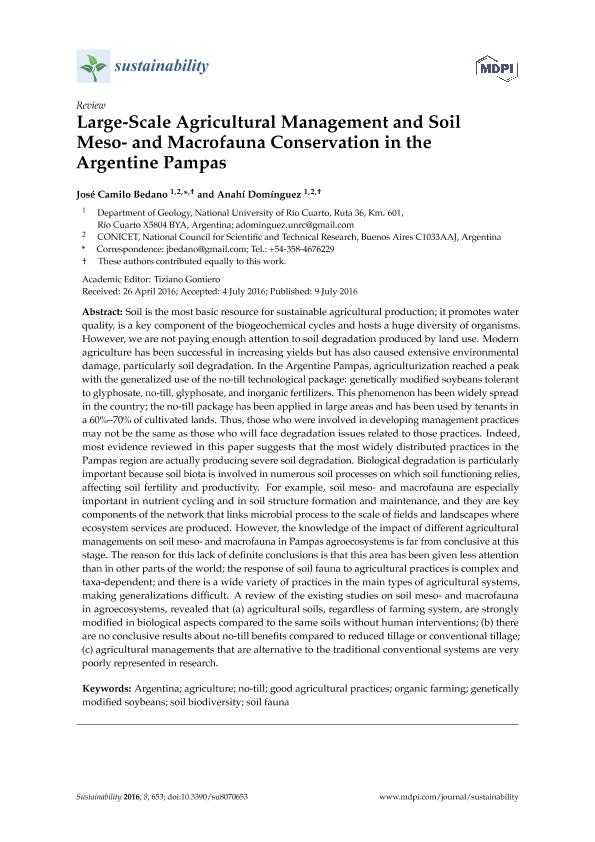Mostrar el registro sencillo del ítem
dc.contributor.author
Bedano, José Camilo

dc.contributor.author
Domínguez, Anahí

dc.date.available
2022-12-01T17:18:28Z
dc.date.issued
2016-07
dc.identifier.citation
Bedano, José Camilo; Domínguez, Anahí; Large-Scale Agricultural Management and Soil Meso- and Macrofauna Conservation in the Argentine Pampas; MDPI; Sustainability; 8; 7; 7-2016; 1-25
dc.identifier.issn
2071-1050
dc.identifier.uri
http://hdl.handle.net/11336/179845
dc.description.abstract
Soil is the most basic resource for sustainable agricultural production; it promotes water quality, is a key component of the biogeochemical cycles and hosts a huge diversity of organisms. However, we are not paying enough attention to soil degradation produced by land use. Modern agriculture has been successful in increasing yields but has also caused extensive environmental damage, particularly soil degradation. In the Argentine Pampas, agriculturization reached a peak with the generalized use of the no-till technological package: genetically modified soybeans tolerant to glyphosate, no-till, glyphosate, and inorganic fertilizers. This phenomenon has been widely spread in the country; the no-till package has been applied in large areas and has been used by tenants in a 60%-70% of cultivated lands. Thus, those who were involved in developing management practices may not be the same as those who will face degradation issues related to those practices. Indeed, most evidence reviewed in this paper suggests that the most widely distributed practices in the Pampas region are actually producing severe soil degradation. Biological degradation is particularly important because soil biota is involved in numerous soil processes on which soil functioning relies, affecting soil fertility and productivity. For example, soil meso- and macrofauna are especially important in nutrient cycling and in soil structure formation and maintenance, and they are key components of the network that links microbial process to the scale of fields and landscapes where ecosystem services are produced. However, the knowledge of the impact of different agricultural managements on soil meso- and macrofauna in Pampas agroecosystems is far from conclusive at this stage. The reason for this lack of definite conclusions is that this area has been given less attention than in other parts of the world; the response of soil fauna to agricultural practices is complex and taxa-dependent; and there is a wide variety of practices in the main types of agricultural systems, making generalizations difficult. A review of the existing studies on soil meso- and macrofauna in agroecosystems, revealed that (a) agricultural soils, regardless of farming system, are strongly modified in biological aspects compared to the same soils without human interventions; (b) there are no conclusive results about no-till benefits compared to reduced tillage or conventional tillage; (c) agricultural managements that are alternative to the traditional conventional systems are very poorly represented in research.
dc.format
application/pdf
dc.language.iso
eng
dc.publisher
MDPI
dc.rights
info:eu-repo/semantics/openAccess
dc.rights.uri
https://creativecommons.org/licenses/by/2.5/ar/
dc.subject
AGRICULTURE
dc.subject
ARGENTINA
dc.subject
GENETICALLY MODIFIED SOYBEANS
dc.subject
GOOD AGRICULTURAL PRACTICES
dc.subject
NO-TILL
dc.subject
ORGANIC FARMING
dc.subject
SOIL BIODIVERSITY
dc.subject
SOIL FAUNA
dc.subject.classification
Ciencias del Suelo

dc.subject.classification
Agricultura, Silvicultura y Pesca

dc.subject.classification
CIENCIAS AGRÍCOLAS

dc.subject.classification
Agricultura

dc.subject.classification
Agricultura, Silvicultura y Pesca

dc.subject.classification
CIENCIAS AGRÍCOLAS

dc.subject.classification
Conservación de la Biodiversidad

dc.subject.classification
Ciencias Biológicas

dc.subject.classification
CIENCIAS NATURALES Y EXACTAS

dc.title
Large-Scale Agricultural Management and Soil Meso- and Macrofauna Conservation in the Argentine Pampas
dc.type
info:eu-repo/semantics/article
dc.type
info:ar-repo/semantics/artículo
dc.type
info:eu-repo/semantics/publishedVersion
dc.date.updated
2022-12-01T14:15:03Z
dc.journal.volume
8
dc.journal.number
7
dc.journal.pagination
1-25
dc.journal.pais
Suiza

dc.description.fil
Fil: Bedano, José Camilo. Universidad Nacional de Río Cuarto; Argentina. Consejo Nacional de Investigaciones Científicas y Técnicas. Centro Científico Tecnológico Conicet - Córdoba; Argentina
dc.description.fil
Fil: Domínguez, Anahí. Universidad Nacional de Río Cuarto; Argentina. Consejo Nacional de Investigaciones Científicas y Técnicas. Centro Científico Tecnológico Conicet - Córdoba; Argentina
dc.journal.title
Sustainability
dc.relation.alternativeid
info:eu-repo/semantics/altIdentifier/url/http://www.mdpi.com/2071-1050/8/7/653
dc.relation.alternativeid
info:eu-repo/semantics/altIdentifier/doi/http://dx.doi.org/10.3390/su8070653
Archivos asociados
